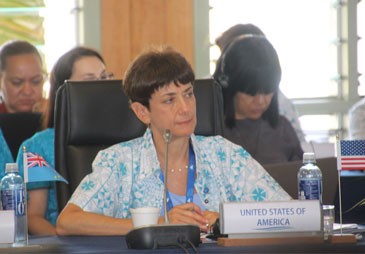
For Immediate Release
A new U.S. Government initiative was launched today to help communities in the Pacific Islands region address the negative effects of climate change.
The United States Agency for International Development will partner with the Pacific Community (SPC), the Pacific Islands Forum Secretariat, and the Secretariat of the Pacific Environment Programme for a five-year initiative that will strengthen the national capacity of up to 12 Pacific Island countries to effectively plan, coordinate and respond to the adverse impacts of climate change.
The Institutional Strengthening in Pacific Island Countries to Adapt to Climate Change (ISACC) project was announced by the U.S. Ambassador to Fiji, Kiribati, Nauru, Tonga and Tuvalu, Judith Cefkin, at the 9th Conference of the Pacific Community under way on the Pacific island of Niue.
The Pacific Community Director-General, Dr Colin Tukuitonga, welcomed the new partnership and its focus on responding to some of the key challenges that limit the ability of Pacific Island countries to effectively implement national climate change priorities.
“Participating countries will benefit from capacity building and training programs, as well as peer-to-peer exchanges through this timely USAID initiative,” Dr Tukuitonga said. “This cooperation expands the support in the Pacific Islands region and will help enable countries to respond urgently and sufficiently to the impacts of climate change,” the Director-General said.
A climate change finance tracking tool will be piloted in at least one Pacific island country with a robust public financial management system to ensure sustainability so that neighbouring islands can learn from its experiences. The project will also carry out selected national climate change finance assessments.
The ISACC project will build on existing national adaptation processes that are multi-sector and whole-of-island approaches that have been successful in the region, and will continue to be sustained by a range of partners through pooling of resources and expertise.
“This will strengthen the adaptation planning processes of each country, including their ability to access and manage climate finance and to build multisector approaches to climate change and disaster risk reduction,” Ambassador Cefkin added.
In addition to working with SPC on climate change adaptation, the United States also supports SPC’s efforts to promote the transition to renewable energy in the Pacific. Last July, the United States, SPC, and the International Renewable Energy Agency (IRENA) hosted 86 participants in Hawaii for a workshop on strategies for increasing renewable energy use among Pacific Island countries.
“By diversifying their portfolios to include clean and sustainable renewable energy, Pacific Island nations will enhance their security and reduce their vulnerability to volatile energy commodity prices,” Ambassador Cefkin told the Conference.
“The United States is committed to working with our partners in the region to increase the climate resilience communities in the Pacific Islands and promote sustainable and inclusive economic development,” Ambassador Cefkin said.
The theme of the biennial Conference, chosen via a public competition in Niue, is “Resilient Pacific People – Turning the Tide.” For more information, visit www.spc.int/crga.
---------------------------------
Media contact
Julie Marks SPC Director of Strategic and Corporate Communication juliem@spc.int, +683 6800
Ezekiel Enrique Development Outreach and Communications Specialist USAID/Philippines Annex 2 Building, U.S. Embassy, eenrique@usaid.gov, +63 2 301.4711
NB: date shown is for Niue (GMT-11 hours)







Comment
Make a general inquiry or suggest an improvement.